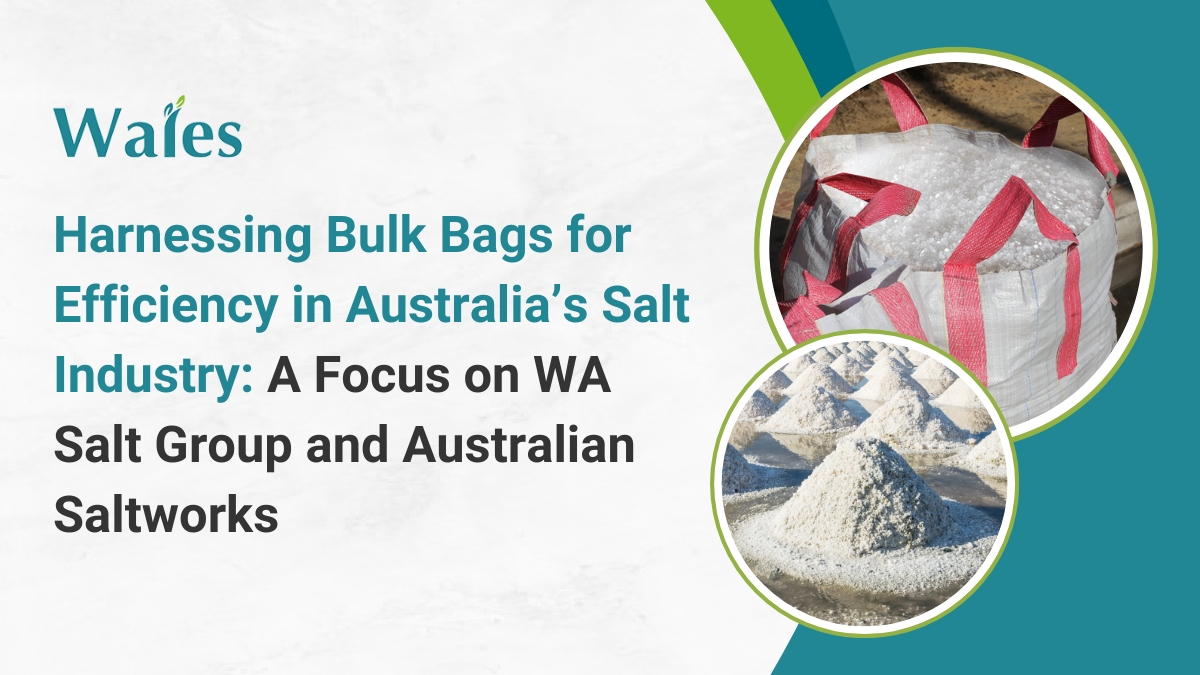Australia’s salt industry, renowned for its pristine solar salt production, relies on innovative logistics and packaging solutions to maintain its global competitiveness. Among these solutions, Flexible Intermediate Bulk Containers (FIBCs), or bulk bags, have emerged as indispensable tools for companies like WA Salt Group and Australian Saltworks. This blog explores how bulk bags optimize salt harvesting, storage, and transportation while addressing industry-specific challenges.
1. The Role of Bulk Bags in Salt Production
Salt production in Australia involves solar evaporation in vast salt pans, where seawater is channeled into crystallizer ponds. Once harvested, the salt must be stored and transported without contamination or moisture absorption. Bulk bags, with their durability and adaptability, are tailored to meet these demands:
- Moisture and Contamination Resistance: Salt’s hygroscopic nature makes moisture control critical. Bulk bags with aluminum or PE liner provide ultra-high protection against oxidation and humidity, preserving product quality.
- Efficient Handling: FIBCs simplify loading and unloading via spouts, reducing labor costs and spillage. For example, custom liners include fitments for seamless integration into existing workflows.
- Cost-Effectiveness: Compared to rigid containers, bulk bags reduce packaging waste and storage space. Companies like Wales Industries offer same-day shipping of 75+ FIBC types, ensuring rapid deployment.
2. Case Study: WA Salt Group’s Bulk Bag Adoption
WA Salt Group, a leader in Western Australia’s salt exports, leverages bulk bags to streamline operations:
- Harvesting Phase: After crystallization, salt is loaded directly into food-grade FIBCs with anti-static properties to prevent clumping. These bags comply with Australia’s stringent food safety regulations, ensuring traceability.
- Storage Solutions: WA Salt Group utilizes UN-certified bulk bags for hazardous material storage, such as salt mixed with anti-caking agents. These bags meet international safety standards, mitigating risks during long-term warehousing.
- Transportation Efficiency: Each FIBC holds up to 1,500 kgs of salt, minimizing shipping costs. The company pairs bulk bags with vacuum-packing technology to extend shelf life during overseas transit.
3. Australian Saltworks: Innovating with Custom Bulk Bags
Australian Saltworks, operating in South Australia’s coastal regions, prioritizes sustainability and efficiency:
- Tailored Designs: Collaborating with suppliers like Wales Industries, Australian Saltworks uses vented FIBCs to enhance airflow during storage, preventing moisture buildup in humid climates.
- Environmental Compliance: The company employs recyclable polypropylene bags to align with Australia’s circular economy goals. Post-use, bags are repurposed into construction materials or returned for refurbishment.
- Disaster Resilience: During extreme weather events, bulk bags double as emergency cofferdams to protect salt pans from flooding—a practice inspired by National Bulk Bag’s water control applications.
4. Technical Advancements in Bulk Bag Design
Recent innovations further solidify bulk bags’ role in the salt sector:
- Vacuum-Packing Capabilities: Bernhardt’s liners eliminate the need for additives like anti-oxidants by creating oxygen-free environments, ideal for premium-grade salt.
- Smart FIBCs: Some suppliers integrate IoT sensors to monitor salt moisture levels in real time, enabling proactive quality control.
- Hybrid Solutions: Combining Multiwall paper bags with FIBC liners offers dual protection against physical damage and environmental factors.
5. Challenges and Future Trends
While bulk bags offer transformative benefits, challenges remain:
- Regulatory Hurdles: Compliance with food-grade and UN certifications requires ongoing audits, particularly for exports to markets like the EU and Asia.
- Customization Costs: Small-scale producers may face higher upfront expenses for specialized liners, through partnerships with providers.
Looking ahead, trends such as biodegradable FIBCs and AI-driven logistics will shape the industry. Australian salt producers are poised to lead this evolution by adopting cutting-edge bulk bag technologies.
Conclusion
For Australia’s salt giants like WA Salt Group and Australian Saltworks, bulk bags are more than packaging—they are strategic assets driving efficiency, sustainability, and global market reach. By embracing innovations in FIBC design and collaborating with industry leaders, these companies ensure that “white gold” remains a cornerstone of Australia’s export economy.
